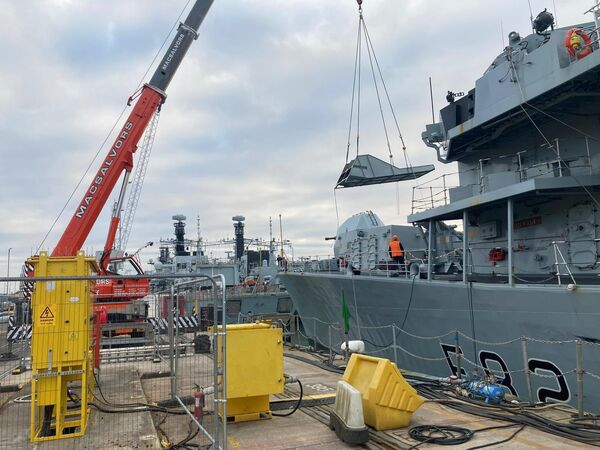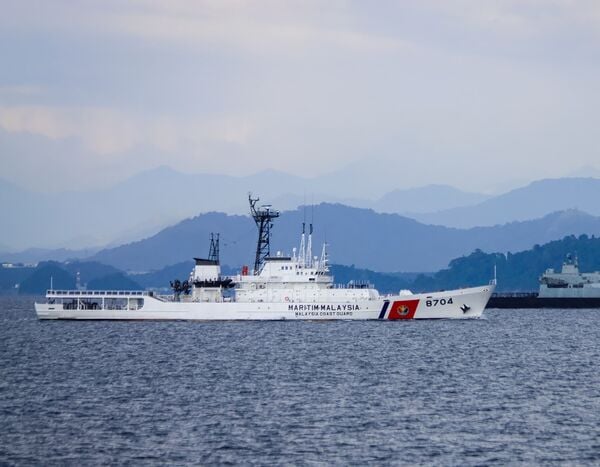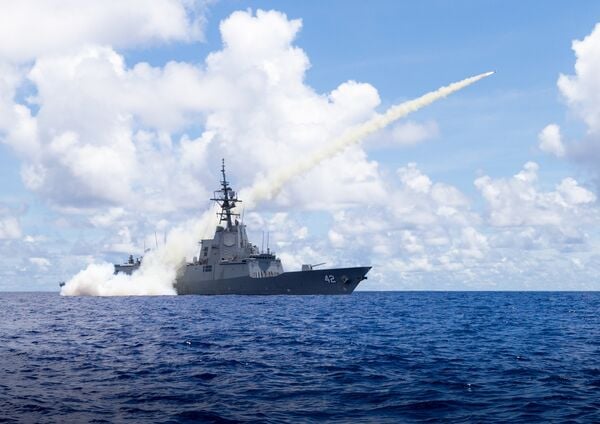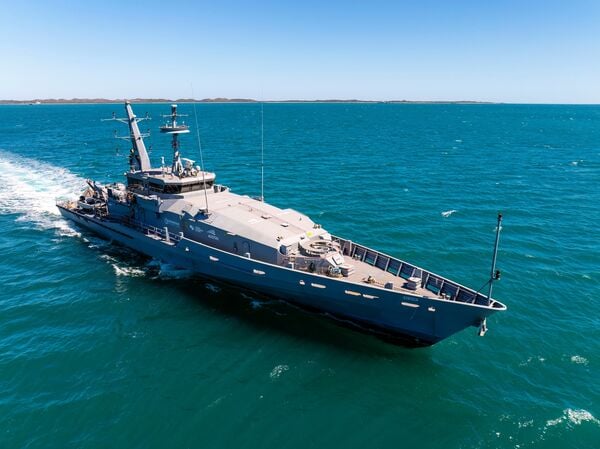- About
- Intara
- Capabilities
- Advisory
- Resources
- News
- Store
Work begins on first NSM fit on Type 23
31 January 2023
by Richard Scott


The MK 141 launcher structure being removed from HMS Somerset in preparation for the installation of NSM. (HMS Somerset/Royal Navy)
The Type 23 frigate HMS Somerset is in line to become the first UK Royal Navy (RN) ship to receive the Kongsberg Defence and Aerospace Naval Strike Missile (NSM).
Replacing the ageing Harpoon Block 1C surface-to-surface guided weapon, which will be retired from service in December this year, NSM is being procured as part of the RN's Maritime Offensive Surface Strike programme. In November 2022, the UK Ministry of Defence confirmed plans to pursue the accelerated acquisition of NSM under a government-to-government sales agreement with Norway.
A total of 11 RN ships – a mix of Type 23 frigates and Type 45 destroyers – will receive NSM, with an initial three vessels being fitted ‘at pace'. The objective is to ensure that a capability is in place by the time Harpoon leaves service at the end of 2023.
Preparations for the NSM fit onboard Somerset
Vietnam issues diplomatic note to Malaysia after South China Sea collision
25 April 2024
by Ridzwan Rahmat


A file image of KM Arau , which collided into a Vietnamese fishing vessel on 22 April. (MMEA)
Hanoi has issued a diplomatic note to Putrajaya after a Malaysia Maritime Enforcement Agency (MMEA) vessel collided into a Vietnamese fishing boat in disputed waters of the South China Sea, multiple sources close to the matter confirmed to Janes .
Vessels involved in the collision are the MMEA's sole Arau (Nojima)-class offshore patrol vessel (OPV) KM Arau and an unnamed fishing boat with pennant number 90729.
The collision took place on 22 April at about 15 n miles southeast of Investigator Shoal, which lies within the Spratly Islands cluster. The feature is occupied by Malaysia, but also claimed by China, Vietnam, and Taiwan as part of their respective maritime territories.
As a result of the collision, 22 fishermen from 90729 fell overboard and a search-and-rescue operation (SAR) was established by both the Vietnamese and Malaysian authorities.
Special Report: Australia to accentuate maritime capabilities amid China's coercion
25 April 2024
by Ridzwan Rahmat


A Royal Australian Navy Hobart-class guided-missile destroyer fires a Harpoon surface-to-surface missile during Exercise ‘Pacific Vanguard' 2022. The class will be equipped with the Naval Strike Missile in the future. (Commonwealth of Australia)
The Australian government has released two more policy documents that outline its defence development intentions over the next few years. The two documents – National Defence Strategy (NDS) 2024 and Integrated Investment Program (IIP) 2024 – were unveiled by Australia's Minister of Defence Richard Marles on 17 April.
The new policies follow Australia's Defence Strategic Review (DSR) – issued in April 2023 – and its evaluation of surface combatant capabilities, which was released earlier in 2024.
As outlined in the IIP 2024, the Australian government is projected to spend AUD765 billion (USD496 billion) in the decade between 2024 and 2034 on defence programmes. This amount includes an additional AUD56 billion above the previous trajectory that was forecast for this period.
Austal completes sea trials for Australia's autonomous patrol boat project
24 April 2024
by Ridzwan Rahmat


Sentinel , the testbed for Australia's Patrol Boat Autonomy Trial project. (Austal)
Australian shipbuilder Austal has completed the sea acceptance trials phase for the country's Patrol Boat Autonomy Trial (PBAT), the company announced on 23 April.
The milestone, which included an endurance trial, was achieved by the project's testbed – a decommissioned Armidale-class patrol boat now known as Sentinel. The vessel was formerly in service with the Royal Australian Navy as HMAS Maitland and retired in 2022.
The PBAT is an Australian government-funded project. Besides Austal Australia, other stakeholders in the project include Fremantle-based engineering company Greenroom Robotics, research centre Trusted Autonomous Systems, and the Royal Australian Navy Warfare Innovation Navy (WIN) Branch.
It seeks to provide a proof-of-concept demonstrator for optionally crewed or autonomous operations.
As part of the trials, Sentinel carried out a series of remote and autonomous navigation events conducted off the Western Australian coastline between March and April, Austal said.
These events were carried out with a software known as Greenroom's Advanced Maritime Autonomy (GAMA) from a Western Australia-based company Greenroom Robotics.
Austral Australia took possession of the decommissioned Maitland
The Type 23 frigate HMS Somerset is in line to become the first UK Royal Navy (RN) ship to receive t...
Latest Podcasts
Iran Israel analysis
In this podcast Janes analysts discuss the Iranian attacks on Israel on the 14 April. They highlight the military systems used by Iran and the performance and impact of these on Israel. They also discuss the implications of this attack goi...
Listen nowJanes Case Studies
Using Janes Intara to build a common intelligence picture: Russian build up on the Ukrainian border
View Case StudyNews Categories
 Weapons Details
Weapons Details